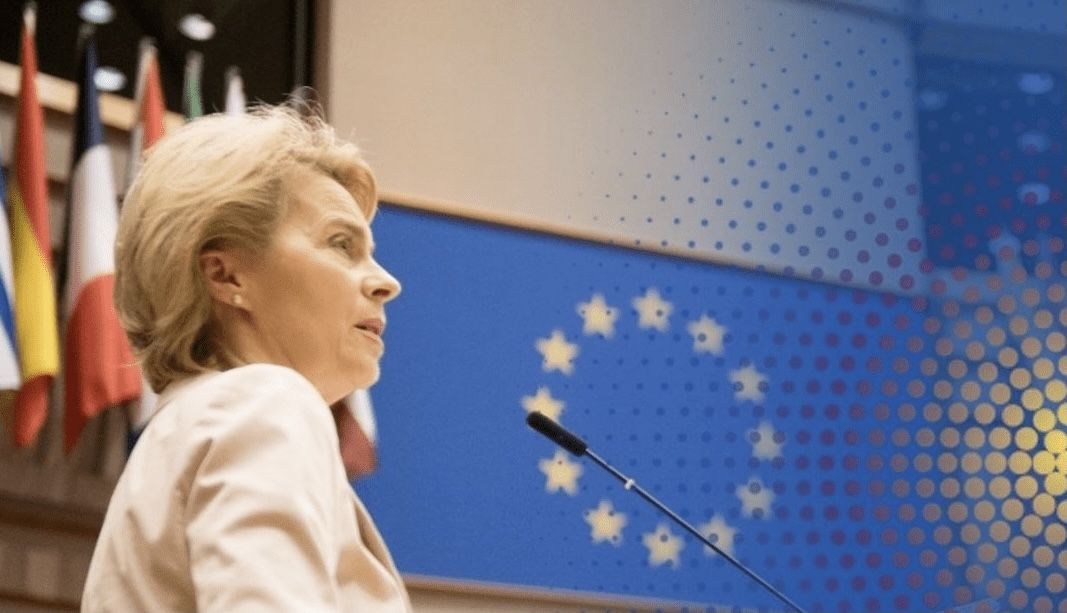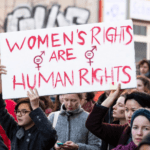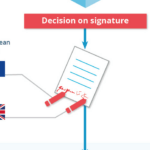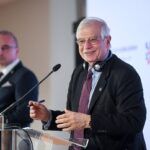The President of the European Commission, Ursula von der Leyen, addressed the Davos Forum today, January 20, with a speech on the main challenges facing the world today. Here are some excerpts of the most significant ideas from her speech.
European democracy, an engine of trust
There is a question that has persisted since the beginning of the pandemic: Are our democracies strong enough and fast enough to face the incredible challenge of COVID-19? Can democracies deliver? I have no doubt. The pandemic has not only demonstrated the ability of our democracies to perform, but it has also shown that democracies are the most powerful, most resilient, and most sustainable form of government. We have not yet defeated COVID-19, but, if we are on track to finally end this pandemic, it is because we have mRNA vaccines developed by European scientists. It is thanks to our values that these scientific breakthroughs have been possible. (…) A total of 1.6 billion doses manufactured in Europe have been delivered to 150 countries. And with the industry producing more than 300 million doses of vaccines every month in Europe, there will be more. (…)
The word “trust” has always been a common thread in all editions of the World Economic Forum. Davos has always been about building trust among leaders and, above all, earning the trust of future generations through responsible leadership. But this year, as never before, trust is the most valuable currency when it comes to the “state of the world”. Trust in science and vaccines can make the difference between life and death. Trust between countries can tip the international balance toward cooperation rather than conflict. Trust in functional societies based on the rule of law channels higher levels of private investment over the long term, giving these societies an advantage over their competitors. And this trust is also essential for all of Europe’s major ambitions. Confidence is essential for citizens to embrace green and digital transformation or to attract young talent. The point is that recovery – whether in Europe or globally – can only be built on trust. And this is what I want to talk about today.
NextGenerationEU: Strong EU response to the current crisis
In the economic and financial crisis a decade ago, Member States did not trust the European institutions to find a European solution. The result was intergovernmental solutions with deep divisions between member states. But this time, with the pandemic economic crisis, the 27 Member States trusted the European institutions. They supported the European Commission to raise capital in the market and to invest it, mainly in our two priorities: the European Green Pact and digitalization. This is NextGenerationEU, our €800 billion recovery program. (…) . We will invest about 40% of NextGenerationEU in green projects. That is, up to 300 billion euros. (…) And more than a third of our bonds were bought by investors outside the European Union. This is a clear sign of confidence in Europe from the rest of the world.
However, we must do more. Public investments will not work miracles if they are not accompanied by strong private investments. Europe alone will need to invest an additional 360 billion euros to transform its energy system – every year. (…) We now have the first European Climate Law, which ensures that our climate targets are not just an ambition, but a legal obligation. We have proposed a detailed legal framework to ensure that we can reduce our emissions by at least 55% by 2030. This is our roadmap for the next decade. This provides certainty and confidence to investors that, if they invest their money in clean and climate-friendly projects, they can trust policymakers to keep their commitments.
European chip law
Or take the critical semiconductor sector. (…) There is nothing digital without chips. And Europe’s need for chips will double in the next decade. That’s why we need to radically raise Europe’s level in the development, production, and use of this key technology. Europe is strong in some specific areas, such as component design for power electronics, or chips for the automotive industry and manufacturing. Europe is the world’s center of semiconductor research. And Europe is also very well positioned in terms of the materials and equipment needed to manufacture large chips. But Europe’s share of the world semiconductor market is only 10% and most of our supplies come from a group of non-European producers. This is dependence and uncertainty that we simply cannot afford. By 2030, 20% of the world’s microchip production should be in Europe. We have to take into account that world production will double. This means quadrupling current European production. We have no time to lose. That is why I can announce that in early February we will propose our European Chips Act. It will help us move forward in five areas. First, we will strengthen our research capabilities and innovation capacity in Europe. Second, we will focus on ensuring European leadership in design and manufacturing. Third, we will further adapt our state aid rules under a set of strict conditions. This will enable public support for “first-of-a-kind” European production facilities that benefit Europe as a whole. Fourth, we will improve our tools to anticipate and respond to shortages and crises in this sector to strengthen our security of supply. And fifth, we will support smaller, innovative start-ups in accessing advanced skills, industrial partners, and equity finance. Let me be clear; Europe will always work to keep global markets open and connected. It is in the world’s interest, and in our own. But we need to address the bottlenecks that hold back our own growth. This will help us to become a strong player, not just in some niches, but across the value chain. Finally, we will promote diversification among like-minded partners. We will create more balanced interdependencies. interdependencies. And we will build supply chains we can rely on, avoiding single points of failure. (…)
Building public confidence in the energy transition
The point is that there will always be times when we need to address broader issues in our economies. And the current global energy pressure is a case in point. It will soon be 50 years since the onset of the oil crisis in the 1970s. Some of us will remember clearly the impact of the crisis on our economy but also on our lives. Some countries banned driving on Sundays or set lower speed limits on highways. Others rationed gasoline or asked people to heat only one room in the house. And many of you are familiar with the debates it provoked about the limits to growth. (…) The good news is that we have many more options available to us today than we did then. Back then, less than 1% of electricity was generated from renewable sources worldwide. Today, that figure has risen to about one-third. Today, we know much more about the climate imperative. And today we have the technologies we need to make the transition from a fossil fuel system to a clean energy system. In the short term, we need to address the real impact this gas crisis is having on households and businesses. My Commission has put forward a set of measures that the Member States are using to quickly mitigate the impact of price increases. But fundamentally, the current gas crisis must serve to accelerate the transition to clean energy. It must provide the impetus we need to further integrate our energy market. And we must ensure that there are no energy islands or regions of Europe that are cut off from our grid. We are working on all these points, but most importantly, we need to carefully manage this necessary transition. And this brings us to the central issue of trust. Because people need to trust that the transition will support the most vulnerable. Businesses need to trust that the transition will improve their competitiveness. And investors need to trust that we will stay the course when there are bumps in the road. (…)
European security is underpinned by the Helsinki Final Act and the Charter of Paris
This brings me to my last point, which is confidence in the international arena. At this moment, the world needs trust in democracy as much as it needs trust between democracies. Because, tragically, we find ourselves once again with the interference of some powers in the affairs of their neighbors. We will not return to the old logic of competition and spheres of influence, where whole countries were treated as possessions or backyards. We have intense days of diplomacy in different formats, with and without Russia. Russia has made its proposals. We have made our proposals. And it is good that we engage in dialogue. But we do not accept Russian attempts to divide Europe into spheres of influence. For us, the fundamental principles underpinning European security remain valid in the Helsinki Final Act and the Charter of Paris, both signed by Russia. And we reaffirm our solidarity with Ukraine and our European partners who are threatened by Russia. And, of course, we continue to support the fundamental principle that Ukraine is free to decide as a sovereign state. To be clear: we want dialogue; we want conflicts to be resolved in the bodies that have been formed for that purpose. But if the situation deteriorates, if there are further attacks on Ukraine’s territorial integrity, we will respond with massive economic and financial sanctions. The transatlantic community stands firm on this. The EU is by far Russia’s largest trading partner and largest investor. And yes, this trade relationship is important for us, but it is much more important for Russia. We hope that an attack will not happen, but if it does happen, we are prepared. And what I want us to never forget is the following: Russia and Europe share geography, culture, and history. We also want a common future. Our difficulties are not with Russia or its people. Our difficulties are with the Kremlin’s dangerous policies. They are a replay of familiar patterns of autocratic behavior that underscore the ultimate travelogue: when trust is lacking, force and coercion cannot replace it.
Europe’s approach is completely different. We believe that trust and security are more sustainable than control and coercion. It is the attractiveness of our liberal democracies that autocrats fear, our economic success, our civil liberties, and freedom of speech and ideas. We must step forward to defend these valuable treasures of our democracies.







Leave a Reply